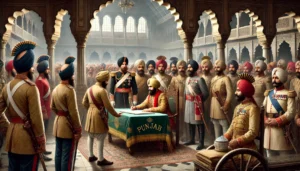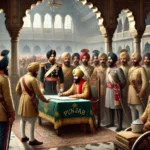PAK YATRA is a tour operator company providing tour services and facilitates Sikh community from different parts of the world.
The Darkest Day in Punjab’s History – 29th March 1849
Punjab, a land of warriors, poets, and unparalleled cultural richness, witnessed one of the darkest days in its history on 29th March 1849. This was the day when the British formally annexed Punjab, marking the end of the glorious Sikh Empire and the beginning of colonial rule. The fall of Lahore Durbar was not just a political defeat but also a deep wound on the soul of Punjab, which had been one of the most prosperous and powerful states in the Indian subcontinent.
The Rise of the Sikh Empire
Under the leadership of Maharaja Ranjit Singh, Punjab flourished as a unified, secular, and powerful state. The Maharaja, known as the “Sher-e-Punjab” (Lion of Punjab), successfully defended his kingdom from external invasions and ensured peace and prosperity for his people. His administration was marked by religious tolerance, military strength, and infrastructural development.
However, after his passing in 1839, Punjab was thrown into political instability. The Lahore Durbar faced internal conflicts, betrayals, and increasing British interference. This instability ultimately led to the Anglo-Sikh Wars, which sealed Punjab’s fate.
The Betrayal and Annexation
The First Anglo-Sikh War (1845-46) ended with the British gaining significant control over Punjab through the Treaty of Lahore. However, they were not satisfied with partial dominance and sought complete control. This led to the Second Anglo-Sikh War (1848-49), which culminated in the British victory at the Battle of Gujrat on 21st February 1849.
On 29th March 1849, Maharaja Duleep Singh, the last ruler of the Sikh Empire and merely a child at the time, was forced to sign the document of surrender. With this, Punjab officially became a part of British India, and the famous Koh-i-Noor diamond was also taken away to England.
This annexation was a direct violation of the earlier treaties, where the British had promised to respect Punjab’s sovereignty. However, driven by their colonial ambitions, they broke their promises, bringing an end to Punjab’s independence.
The Aftermath – A Lost Glory
The annexation of Punjab was a turning point in history. The once-thriving Sikh Empire was dismantled, and the people of Punjab were subjected to foreign rule. The British systematically weakened the social and economic fabric of Punjab.
However, the spirit of Punjab never died. The Sikhs, along with other Punjabis, played a crucial role in India’s freedom struggle. From Shaheed Bhagat Singh to Udham Singh, Punjab gave birth to countless revolutionaries who fought for independence.
Remembering 29th March 1849
Even today, the annexation of Punjab remains a painful chapter in history. It reminds us of the importance of unity, strong leadership, and the consequences of internal conflicts. As we look back, we must also look forward – honoring our heritage and working towards a strong and prosperous Punjab.
This day should serve as a lesson for future generations: the importance of self-reliance, vigilance, and never compromising on sovereignty. The fall of Punjab in 1849 was not just a loss of land but a loss of a powerful identity, one that we must always strive to revive and protect.
Punjab Zindabad!





